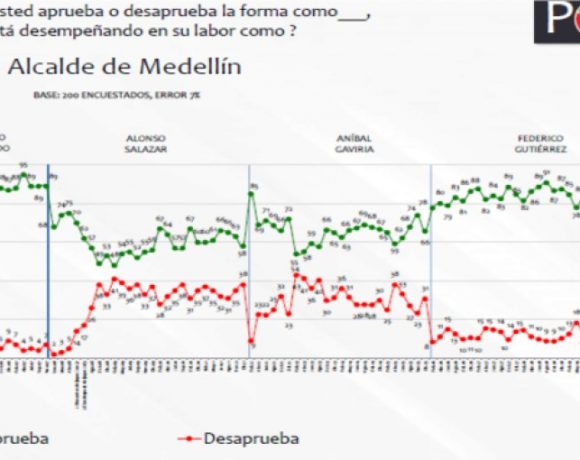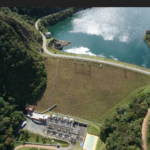Alleged Conflicts-of-Interest in Hidroituango Damages-Recovery Scheme Prompts Clash Between Trade Groups, Mayor Quintero, Former Governor Perez, Former VP German Vargas

Former Colombia Vice President Germán Vargas Lleras, former Antioquia Governor Luis Perez and current Medellin Mayor Daniel Quintero are making noises over supposedly questionable conflicts-of-interest that triggered the mass resignation of EPM’s entire Board of Directors this month following EPM’s sudden “conciliation” lawsuit against Hidroituango contractors and insurers.
In an August 15, 2020 interview in daily newspaper El Tiempo (Bogota), Mayor Quintero is quoted as saying that “some members [of EPM’s Board] — Medellín knows it as a whole — had or have very close relationships with the defendant consortia” in the conciliation lawsuit.
Similarly, former Colombia VP Vargas claimed in an August 16, 2020 opinion column in daily newspaper El Tiempo (Bogota) that the only way for EPM to recover massive losses caused by a 2018 diversion-tunnel collapse in the US$5 billion “Hidroituango” hydroelectric project is for EPM to do what it just did: sue the project contractors and their insurers, in conciliation (see Medellin Herald August 11, 2020, “EPM, Construction Contractors in Conciliation on US$2.6 Billion Losses from Hidroituango Tunnel Collapse in 2018”).
Vargas suggests that this conciliation lawsuit is necessary because the now-departed members of EPM’s Board of Directors didn’t have EPM’s interest at heart, but rather were more interested in protecting Hidroituango contractors and insurers.
Rationale: Some of the newly-exited EPM board members had historic indirect ties to the influential Grupo Empresarial Antioqueño (GEA), a group of companies with interlocking stock holdings and which have had business relationships with EPM for many years.
What’s more, some former EPM general managers have or had worked for GEA companies and/or companies now involved in the conciliation lawsuit, Vargas noted, claiming that this somehow helps explain the mass resignation of the latest Board. Problem with this argument: the former EPM general managers weren’t on the current (just-resigned) EPM Board, undercutting the logic of the critique.
In any case, it’s not clear that even a supposed interest-conflicted Board would have voted to block EPM and Mayor Quintero from bringing the new conciliation lawsuit claims. Reason: They weren’t given a chance to debate the conciliation proposal, so it’s pure speculation to conclude what they would have done.
Former Antioquia Governor Luis Perez – who frequently clashed with former Medellin Mayor Federico Gutierrez over assigning blame for the Hidroituango diversion-tunnel collapse – likewise made similar insinuations in an August 12 interview with local TV station Cosmovision.
One problem with these Quintero, Vargas and Perez attacks: Except for now-former Board member Luis Fernando Álvarez Jaramillo — who says on his resume that he is or was a legal advisor to Integral SA, one of the companies being sued in the conciliation proceeding — the other seven of the eight EPM Board members who just resigned lack any current legal ties to any of the Hidroituango contractors, overseers or insurers – even if some of them had indirect or direct ties in the past. What’s more, only two of the now-former Board members historically had any ties to GEA companies.
Former Board member Andrés Bernal Correa – who in the past had risen to become a VP at Sura, one of the construction-contractor insurance companies being sued in the new conciliation action — stated in an August 13 interview with local Medellin newspaper Vivir en El Poblado that the Quintero/Rendon decision to bypass the Board and sue contractors and insurers for conciliation contradicted already partly successful negotiations with project insurer Mapfre.
“We were already recovering the money [for Hidroituango damages], in fact the insurer [Mapfre] has already paid close to COP$550 billion (US$145 million),” Bernal said in that interview.
“What the [EPM] manager did [bringing the conciliation lawsuit] is one of the options [for damages recovery] and if we had studied it in the meeting, then we could have defined whether it was the most appropriate or not. We have always sought to recover that money. We were already recovering it. It is not that what the manager did was the only option. There are different paths and the right thing would have been analyzing pros and cons to make the best decision.”
Another of the just-resigned board members is Manuel Santiago Mejía, a founder of major retail group Corbeta and board member of civic-promotion group Proantioquia, which includes many GEA companies. However, Mejía doesn’t have any direct legal interest in the contractors or insurers being sued in the Hidroituango conciliation.
The other now-former EPM board members aren’t directly connected to any of the companies being sued.
Former Board member Aristizábal Guevara — a retired EPM manager — was a former board member of the Hidroituango corporate oversight entity, who (at worst) conceivably could be questioned for approving certain engineering decisions that possibly might have been linked to the tunnel-collapse incident. But there’s no published evidence showing he has any legal ties to GEA or the contractors.
Gabriel Ricardo Maya, first appointed to the Board in 2006 by former Medellin Mayor Sergio Fajardo, likewise doesn’t have any proven ties to the companies involved. Similarly, Javier Genaro Gutiérrez Pemberthy — a former president of Colombia’s mostly state-owned Ecopetrol oil company — doesn’t have known ties to the companies being sued.
The same lack of any legal ties to the companies being sued goes for now-former Board members Alberto Arroyave Lema and Elena Rico Villegas.
So what is all the noise about some supposed GEA plot and conflicts-of-interest?
ANDI Response
Just ugly noise, according to Bruce MacMaster, President of ANDI, Colombia’s biggest industrial and commercial trade association.
In an August 16 public bulletin issued by ANDI, MacMaster states the following (reproduced below in full):
“There are games that are dangerous and our politics is full of them. Populist attitudes that only seek to win votes by selling illusions [that] are impossible or unsustainable over time.
“The honor of people, as well as the reputation of institutions, is one of the greatest intangible assets that we have.
“During this week, given the serious situation that arose in EPM, the strategy of the municipal administration and some politicians has been to attack the reputation of past administrations and entities that have served Antioquia with honesty and example.
“The destruction of reputation is often effective in order to disqualify those who think differently, but it turns out to be the most unfair strategy intellectually and harmful for those who are being attacked.
“Of course, it is a violation of all the principles of corporate governance to make decisions behind the back of the Board of Directors and, even worse, to suggest that the reason why it was not informed is because it was likely that the decision would be ‘screwed up’ there.
“If that is the case, then how can it be understood that the Mayor [Quintero] was willing to continue with that Board and that he disagrees with its resignation?
“Of course, it is a bad practice of corporate governance [to bypass the Board on transcendental matters] — and it is not the fault of the Mayor that [under current EPM corporate statutes] the Manager of EPM is handpicked by the Mayor as if he were a cabinet secretary.
“Of course, it is a bad practice of corporate governance for the Mayor to be the Chairman of the Board of EPM. This [current EPM corporate statute] is not the Mayor’s fault either, but it is obviously rejected by all entities such as the OECD. This is indeed an opportunity to put the house in order by changing these two provisions.
“EPM is a company and it is mandatory that everything around it works as such. It cannot be a hybrid between company and secretariat. If Medellín wants our public company to be successful in the market and annually provide more than COP$1 trillion [US$264 million] to the city so that Medellín can continue to be the envy of all, then it has to be well managed.
“There are many challenges EPM has at this time, perhaps more than ever, because EPM requires the most-expert of the experts to lead it.
“Why has the Antioquia business sector participated so actively in the processes of building public policy in the region? For one reason only: because the business sector is one of the few communities that has fully understood that public responsibility is everyone’s responsibility.
“Because the business community has also understood that politicians, in the best of cases, are good at defining public policy, in the legislative exercise, and in social leadership — but that without a doubt politicians have immense shortcomings that can be strengthened by the administration of companies, in the creation of innovative processes and in the gestation and sustainability of entities that deserve the attention of the entire community, such as universities, museums, parks, or libraries.
“How much we have admired and even envied the commitment of the Antioquia community and society with their region! How many exemplary results have been achieved, which has been recognized by all in Colombia and beyond! Who are bothered by these results? Who wants to appropriate the ‘jewel in the crown?’ [that is, EPM].
“It is paradoxical to try to attack what has been a great virtue: that people who work for their society [are viewed by some] as pernicious. It is impossible not to think that this situation is being used by some politicians as the opportunity to get rid of the discomfort of being audited, accompanied, supervised, controlled and guided. Do politicians really think that they are the only ones with the possibility of giving an opinion and contributing to the construction of the public good?
“There will be those who say that these [oversight] functions are of the comptrollers, auditors and prosecutors. And they are partly right. But they forget that the latter [public enforcement regulators] have been designed to identify and punish mistakes, but not to get it right. Getting it right is not the job of not making mistakes, but rather of doing things well, and hopefully better and better. This is where the participation of the best minds and wills of any society make the best opportunities.
“Insinuations that the Antioquia business community takes advantage of positions in entities [such as the EPM Board of Directors] are unacceptable. If someone has complaints to make, then they have the obligation to make them. Not in opinion columns, or radio statements with generalities and statements that manage to cast a blanket of doubt about the reputation of institutions that have worked hard for the country. But [such charges should be brought] before the authorities, with evidence and making sure not to make reckless complaints.
“To affirm that the Grupo Empresarial Antioqueño and the business community have tried to appropriate EPM is not only false and manipulated, but it is also an accusation of immense gravity that merits the firm rejection of those of us who know the organization, its ethics and the principles that govern it. This strategy [of demagoguery] seems more like an attempt to get society to hand over everything of value to some political groups, rather than responsible reasoning.
“I reiterate our invitation to the Mayor to reflect on everything that can be lost at this time in Antioquia due to a situation that deserves to be redirected, taking into account the good of all, the future of society, the immense values built over the years, the possibility of community and joint work of proven suitability and with great possibilities of yielding virtuous results, putting aside any temptation of the ego, or the voices of counselors with intentions that raise many questions as well.
“This is not an issue only for Antioquia, it is a national issue. We must all defend EPM, but also defend the community of Antioquia businessmen who have done so much good for society and how necessary it is at this time in which Colombia requires activating all the instruments to generate employment, production and wealth for Colombian families.”
















